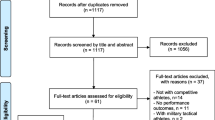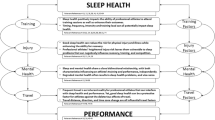Abstract
Background
Athletes experience various situations and conditions that can interfere with their sleep, which is crucial for optimal psychological and physiological recovery as well as subsequent performance. Conventional sleep screening and intervention approaches may not be efficacious for athletes given their lifestyle, the demands of training and travel associated with interstate/international competition.
Objectives
The present systematic review aimed to summarize and evaluate sleep intervention studies targeting subsequent performance and recovery in competitive athletes. Based on the findings, a secondary aim was to outline a possible sleep intervention for athletes, including recommendations for content, mode of delivery and evaluation.
Methods
A systematic review was conducted based on the PRISMA guidelines in May 2016 with an update completed in September 2017. Ten studies met our inclusion criteria comprising a total of 218 participants in the age range of 18–24 years with athletes from various sports (e.g., swimming, soccer, basketball, tennis). A modified version of the quality assessment scale developed by Abernethy and Bleakley was used to evaluate the quality of the studies.
Results
The included studies implemented several sleep interventions, including sleep extension and napping, sleep hygiene, and post-exercise recovery strategies. Evidence suggests that sleep extension had the most beneficial effects on subsequent performance. Consistent with previous research, these results suggest that sleep plays an important role in some, but not all, aspects of athletes’ performance and recovery.
Conclusion
Future researchers should aim to conduct sleep interventions among different athlete populations, compare results, and further establish guidelines and intervention tools for athletes to address their specific sleep demands and disturbances.


Similar content being viewed by others
References
Harries SK, Lubans DR, Callister R. Systematic review and meta-analysis of linear and undulating periodized resistance training programs on muscular strength. J Strength Cond Res. 2015;29:1113–25. https://doi.org/10.1519/JSC.0000000000000712.
Spriet LL. Nutritional support for athletic performance. Sports Med. 2015;45:S3–4. https://doi.org/10.1007/s40279-015-0402-z.
Fullagar HHK, Skorski S, Duffield R, et al. Sleep and athletic performance: The effects of sleep loss on exercise performance, and physiological and cognitive responses to exercise. Sports Med. 2015;45:161–86. https://doi.org/10.1007/s40279-014-0260-0.
Halson SL. Recovery techniques for athletes. Sport Sci Exch. 2013;26:1–6. https://doi.org/10.1136/jmg.2003.014902.
Brand S, Beck J, Gerber M, et al. “Football is good for your sleep”: favorable sleep patterns and psychological functioning of adolescent male intense football players compared to controls. J Health Psychol. 2009;14:1144–55. https://doi.org/10.1177/1359105309342602.
Samuels C. Sleep, recovery, and performance: the new frontier in high-performance athletics. Phys Med Rehabil Clin N Am. 2009;20:149–59. https://doi.org/10.1016/j.pmr.2008.10.009.
Venter RE. Perceptions of team athletes on the importance of recovery modalities. Eur J Sport Sci. 2014;14:1–8. https://doi.org/10.1080/17461391.2011.643924.
Reilly T, Edwards B. Altered sleep-wake cycles and physical performance in athletes. Physiol Behav. 2007;90:274–84. https://doi.org/10.1016/j.physbeh.2006.09.017.
Coutts AJ, Reaburn ÆP, Piva ÆTJ, et al. Monitoring for overreaching in rugby league players. Eur J Appl Physiol. 2007;99:313–24. https://doi.org/10.1007/s00421-006-0345-z.
Jürimäe J, Mäestu J, Purge P, et al. Changes in stress and recovery after heavy training in rowers. J Sci Med Sport. 2004;7:335–9. https://doi.org/10.1016/S1440-2440(04)80028-8.
Halson SL. Nutrition, sleep and recovery. Eur J Sport Sci. 2008;8:119–26. https://doi.org/10.1080/17461390801954794.
Shapiro CM, Bortz R, Mitchell D, et al. Slow-wave sleep: a recovery period after exercise. Science. 1981;214:1253–4. https://doi.org/10.1126/science.7302594.
Obal F, Krueger JM. GHRH and sleep. Sleep Med Rev. 2004;8:367–77. https://doi.org/10.1016/j.smrv.2004.03.005.
Skein M, Duffield R, Edge J, et al. Intermittent-sprint performance and muscle glycogen after 30 h of sleep deprivation. Med Sci Sports Exerc. 2011;43:1301–11. https://doi.org/10.1249/MSS.0b013e31820abc5a.
Costill DL, Flynn MG, Kirwan JP, et al. Effects of repeated days of intensified training on muscle glycogen and swimming performance. Med Sci Sports Exerc. 1988;20:249–54. https://doi.org/10.1249/00005768-198806000-00006.
Ferrara M, De Gennaro L. How much sleep do we need? Sleep Med Rev. 2001;5:155–79. https://doi.org/10.1053/smrv.2000.0138.
National Sleep Foundation. National Sleep Foundation 2013 poll [Internet]. 2013. https://www.sleepfoundation.org/2013pol. Accessed 13 Jan 2018.
Calder A. Recovery strategies for sports performance. Strategies. 2002;15:8–11.
Mah CD, Mah KE, Kezirian EJ, et al. The effects of sleep extension on the athletic performance of collegiate basketball players. Sleep. 2011;34:943–50. https://doi.org/10.5665/sleep.1132.
Mah CD, Mah KE, Dement WC. Athletic performance and sleep extension in collegiate tennis players. Sleep. 2009;32:A155.
Gupta L, Morgan K, Gilchrist S. Does elite sport degrade sleep quality? A systematic review. Sports Med. 2016; pp 1–17. https://doi.org/10.1007/s40279-016-0650-6.
Pedersen DJ, Lessard SJ, Coffey VG, et al. High rates of muscle glycogen resynthesis after exhaustive exercise when carbohydrate is coingested with caffeine. J Appl Physiol. 1985;2008(105):7–13. https://doi.org/10.1152/01121.2007.
Fietze I, Strauch J, Holzhausen M, et al. Sleep quality in professional ballet dancers. Chronobiol Int. 2009;26:1249–62. https://doi.org/10.3109/07420520903221319.
Leeder J, Glaister M, Pizzoferro K, et al. Sleep duration and quality in elite athletes measured using wristwatch actigraphy. J Sports Sci. 2012;30:541–5. https://doi.org/10.1080/02640414.2012.660188.
Erlacher D, Ehrlenspiel F, Adegbesan OA, et al. Sleep habits in German athletes before important competitions or games. J Sports Sci. 2011;29:859–66. https://doi.org/10.1080/02640414.2011.565782.
Silva A, Queiroz SS, Winckler C, et al. Sleep quality evaluation, chronotype, sleepiness and anxiety of Paralympic Brazilian athletes: Beijing 2008 Paralympic Games. Br J Sports Med. 2012;46:150–4. https://doi.org/10.1136/bjsm.2010.077016.
Harada T, Wada K, Tsuji F, et al. Intervention study using a leaflet entitled ‘Three benefits of “Go to bed early! Get up early! And intake nutritionally rich breakfast!” a message for athletes’ to improve the soccer performance of university soccer team. Sleep Biol Rhythms. 2016;14:S65–74. https://doi.org/10.1007/s41105-015-0035-5.
Schaal K, Le Meur Y, Louis J, et al. Whole-body cryostimulation limits overreaching in elite synchronized swimmers. Med Sci Sports Exerc. 2015;47:1416–25. https://doi.org/10.1249/MSS.0000000000000546.
Morita Y, Ogawa K, Uchida S. Napping after complex motor learning enhances juggling performance. Sleep Sci. 2016;9:112–6. https://doi.org/10.1016/j.slsci.2016.04.002.
Pelka M, Kölling S, Ferrauti A, et al. Acute effects of psychological relaxation techniques between two physical tasks. J Sports Sci. 2016;pp 1–8. https://doi.org/10.1080/02640414.2016.1161208
Waterhouse J, Atkinson G, Edwards B, et al. The role of a short post-lunch nap in improving cognitive, motor, and sprint performance in participants with partial sleep deprivation. J Sports Sci. 2007;25:1557–66. https://doi.org/10.1080/02640410701244983.
McCloughan LJ, Hanrahan SJ, Anderson R, et al. Psychological recovery: progressive muscle relaxation (PMR), anxiety, and sleep in dancers. Perform Enhanc Health. 2016;4:12–7. https://doi.org/10.1016/j.peh.2015.11.002.
Moher D, Liberati A, Tetzlaff J, et al. Preferred reporting items for systematic reviews and meta-analyses: The PRISMA Statement. Ann Intern Med. 2009;151:264–9. https://doi.org/10.1371/journal.pmed1000097.
World Anti-Doping Agency. World Anti-Doping Code 2015. https://www.wada-ama.org/en/resources/the-code/world-anti-doping-code. Accessed 13 Jan 2018.
Emsellem HA, Murtagh KE. Sleep apnea and sports performance. Clin Sport Med. 2005;24:329–41. https://doi.org/10.1016/j.csm.2005.01.002.
Abernethy L, Bleakley C. Strategies to prevent injury in adolescent sport: a systematic review. Br J Sports Med. 2007;41:627–38. https://doi.org/10.1136/bjsm.2007.035691.
Davies DJ, Graham KS, Chow CM. The effect of prior endurance training on nap sleep patterns. Int J Sports Physiol Perform. 2010;5:87–97.
Zhao J, Tian Y, Nie J, et al. Red light and the sleep quality and endurance performance of Chinese female basketball players. J Athl Train. 2012;47:673–8. https://doi.org/10.4085/1062-6050-47.6.08.
Fowler PM, Duffield R, Morrow I, et al. Effects of sleep hygiene and artificial bright light interventions on recovery from simulated international air travel. Eur J Appl Physiol. 2014;115:541–53. https://doi.org/10.1007/s00421-014-3043-2.
Fullagar H, Skorski S, Duffield R, et al. The effect of an acute sleep hygiene strategy following a late-night soccer match on recovery of players. Chronobiol Int. 2016;528:1–16. https://doi.org/10.3109/07420528.2016.1149190.
Petit E, Mougin F, Bourdin H, et al. A 20-min nap in athletes changes subsequent sleep architecture but does not alter physical performances after normal sleep or 5-h phase-advance conditions. Eur J Appl Physiol. 2014;114:305–15. https://doi.org/10.1007/s00421-013-2776-7.
Van Ryswyk E, Weeks R, Bandick L, et al. A novel sleep optimisation programme to improve athletes’ well-being and performance. Eur J Sport Sci. 2016;1391:1–8. https://doi.org/10.1080/17461391.2016.1221470.
Schwartz J, Simon RD. Sleep extension improves serving accuracy: a study with college varsity tennis players. Physiol Behav. 2015;151:541–4. https://doi.org/10.1016/j.physbeh.2015.08.035.
Reilly T, Piercy M. The effect of partial sleep deprivation on weight-lifting performance. Ergonomics. 1994;37:107–15. https://doi.org/10.1080/00140139408963628.
Schneerson JM. Handbook of sleep. Cambridge: Blackwell Science; 2000.
Morgenthaler T, Kramer M, Alessi C, et al. Practice parameters for the psychological and behavioral treatment of insomnia: an update. An American Academy of Sleep Medicine report. Sleep. 2006;29:1415–9.
Buysse DJ, Germain A, Moul DE, et al. Efficacy of brief behavioral treatment for chronic insomnia in older adults. Arch Intern Med. 2011;171:887–95. https://doi.org/10.1001/archinternmed.2010.535.
Meeusen R, Duclos M, Foster C, et al. Prevention, diagnosis and treatment of the overtraining syndrome: joint consensus statement of the European College of Sport Science (ECSS) and the American College of Sports Medicine (ACSM). Eur J Sport Sci. 2012;13:1–24. https://doi.org/10.1080/17461391.2012.730061.
Mallampalli MP, Carter CL. Exploring sex and gender differences in sleep health: a Society for Women’s Health Research Report. J Womens Health (Larchmt). 2014;23:553–62. https://doi.org/10.1089/jwh.2014.4816.
Bonnar D, Gradisar M, Moseley L, et al. Evaluation of novel school-based interventions for adolescent sleep problems: does parental involvement and bright light improve outcomes? Sleep Health. 2015;1:66–74. https://doi.org/10.1016/j.sleh.2014.11.002.
Halson SL. Stealing sleep: is sport or society to blame? Br J Sports Med. 2016;50:381. https://doi.org/10.1136/bjsports-2015-094961.
Sargent C, Lastella M, Halson SL, et al. The validity of activity monitors for measuring sleep in elite athletes. J Sci Med Sport. 2016;19:848–53. https://doi.org/10.1016/j.jsams.2015.12.007.
Samuels C, James L, Lawson D, et al. The Athlete Sleep Screening Questionnaire: a new tool for assessing and managing sleep in elite athletes. Br J Sports Med. 2015; pp 1–5. https://doi.org/10.1136/bjsports-2014-094332.
Harvey AG, Sharpley AL, Ree MJ, et al. An open trial of cognitive therapy for chronic insomnia. Behav Res Ther. 2007;45:2491–501. https://doi.org/10.1016/j.brat.2007.04.007.
Sargent C, Halson S, Roach GD. Sleep or swim? Early-morning training severely restricts the amount of sleep obtained by elite swimmers. Eur J Sport Sci. 2014;14:S310–5. https://doi.org/10.1080/17461391.2012.696711.
Miller WR, Rollnick S. Motivational interviewing: helping people change. New York: Guildford Press; 2012.
Cassoff J, Knäuper B, Michaelsen S, et al. School-based sleep promotion programs: effectiveness, feasibility and insights for future research. Sleep Med Rev. 2013;17:207–14. https://doi.org/10.1016/j.smrv.2012.07.001.
Kaplan KA, Harvey AG. Treatment of sleep disturbance. In: Barlow DH, editor. Clinical handbook of psychological disorders. 5th ed. New York: Guilford Press; 2014. p. 640–69.
Author information
Authors and Affiliations
Contributions
Daniel Bonnar, Kate Bartel, Christin Lang, and Naomi Kakoschke conceived and designed the study. Daniel Bonnar and Kate Bartel performed the literature search, were responsible for decisions on inclusion/exclusion of articles, quality assessment and data extraction (with Christin Lang as the decider if there was disagreement). Naomi Kakoschke drafted and critically revised the study. Christin Lang and Daniel Bonnar wrote the Introduction section; Kate Bartel wrote the Methods section; Daniel Bonnar, Christin Lang, and Kate Bartel wrote the Results section; Daniel Bonnar, Kate Bartel, Christin Lang, and Naomi Kakoschke wrote the Discussion section.
Corresponding author
Ethics declarations
Funding
No sources of funding were used to assist in the preparation of this article.
Conflict of interest
Daniel Bonnar, Kate Bartel, Naomi Kakoschke, and Christin Lang declare that they have no conflicts of interest relevant to the content of this review.
Rights and permissions
About this article
Cite this article
Bonnar, D., Bartel, K., Kakoschke, N. et al. Sleep Interventions Designed to Improve Athletic Performance and Recovery: A Systematic Review of Current Approaches. Sports Med 48, 683–703 (2018). https://doi.org/10.1007/s40279-017-0832-x
Published:
Issue Date:
DOI: https://doi.org/10.1007/s40279-017-0832-x




